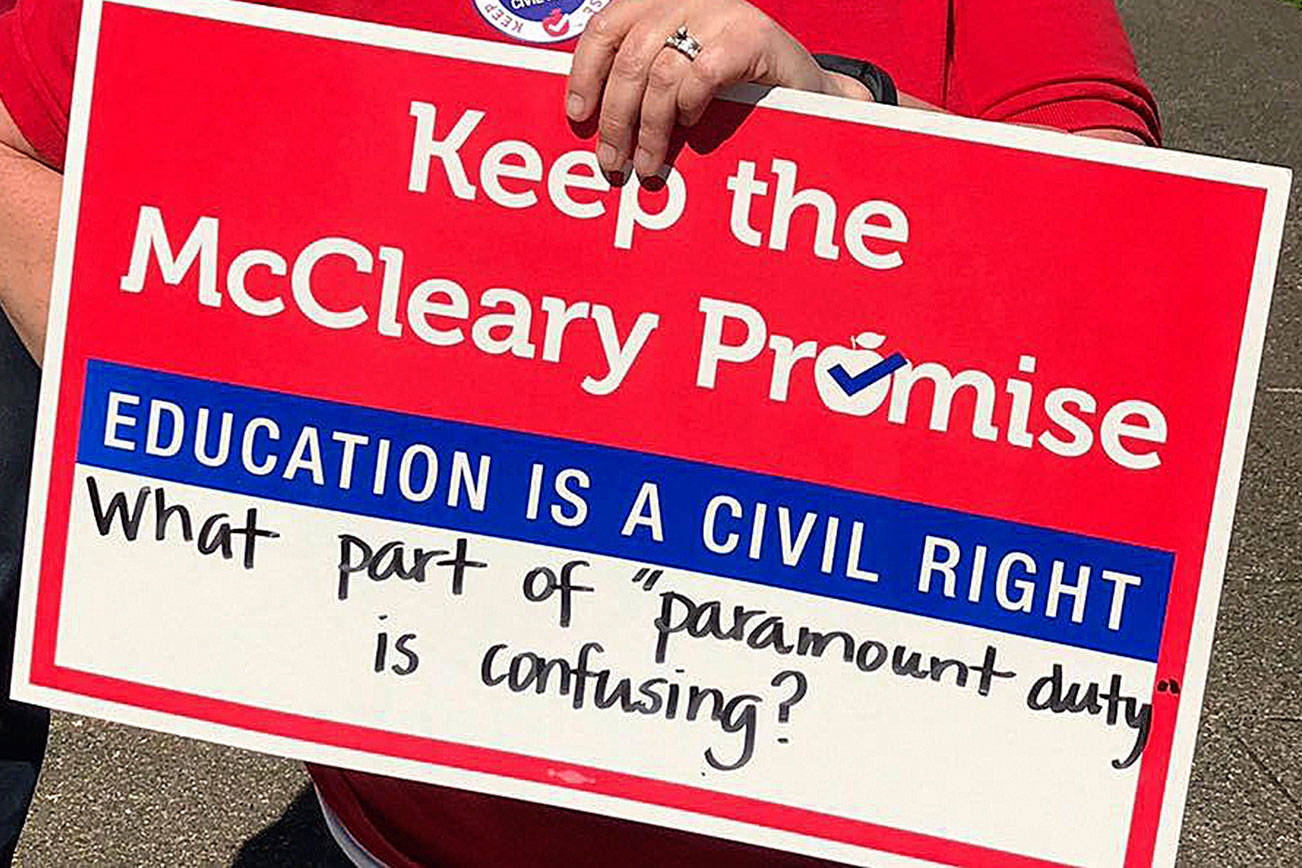Local school district teachers awoke the morning of April 3 to a shock. In the state Senate at 1:30 a.m., the Ways and Means Committee made changes to a proposed bill, 5313, that could greatly affect teacher and staff compensation. Following weeks of outcry from teacher associations across the state, the bill now appears to be dead.
Teachers and their supporters are now using the legislation and its amendments to illustrate how changes to legislation can be slipped into a bill almost unnoticed.
Background
Senate bill 5313 (SB 5313) was first introduced by state Sen. Lisa Wellman in early January. The bill would modify the formula for the determination of the allocation of state matching funds to eligible school districts for local effort assistance, according to the bill digest.
The bill, if passed, would raise levy lid rates from $1.50 per $1,000 of assessed valuation to $2.50 per $1,000. A district with fewer than 40,000 students could collect the lesser of $2.50 per $1,000 of assessed value or $2,500 per student. Districts with more than 40,000 students could take in the lesser of $2.50 per $1,000 of assessed value or $3,000 per student.
On April 3, the Ways and Means Committee amended the bill. The change would limit the size of pay raises that districts could give teachers out of those local tax receipts. In essence, the amendment would significantly reduce teacher compensation and limit their collective bargaining rights.
Teachers’ response
Several Eastside school district education associations voiced their concern of the amendment.
Nate Ziemkowski, president of the Snoqualmie Valley Education Association (SVEA) and a second- and third-grade teacher at Snoqualmie Elementary said the amendment would cut teachers’ salaries by thousands of dollars.
“Just as our state is making progress on attracting and keeping great teachers, (state Sen. Mark Mullet’s) amendment to SB 5313 would cut teacher pay by thousands of dollars,” he said. “As schools struggle with a teacher shortage, cutting teacher pay is an awful, irresponsible policy decision that will force promising future educators out of the profession. Even considering pay cuts for teachers is an unacceptable step down the wrong path.”
The following day, April 4, Ziemkowski and other SVEA members went to Olympia to voice their concerns about the amendment.
“SVEA is down in Olympia outside the Senate chamber waiting to speak with Sen. Mullet about his bad amendment to SB 5313,” the SVEA Facebook post read. “His amendment will cut educator pay by $5,000 by 2022 and make it illegal for us to collectively bargain competitive professional pay.”
Michele Miller, Washington Education Association (WEA) Sammamish UniServ council president and a Bellevue School District (BSD) elementary instructional mentor said the bill would reverse the work done by the McCleary Decision.
“We’ve really started to come a long way to having adequate compensation for teachers, and now we have this bill that could reverse that,” she said. “This bill could cost people’s salaries to go backwards or freeze… The thought of going backwards is just insulting.”
Miller continued that the effect of the bill could have a ripple effect on schools, students and the communities.
“Everyone suffers when things like this happen,” she said. “This is bad for schools, educators and students.”
On April 4, Wellman released a letter responding to the amendments.
“These amendments don’t reflect my values or the values of the Democratic caucus… If this bill were to pass, teachers’ salaries would be cut and their bargaining abilities would suffer. That is accurate,” she said in the letter. “I want to reiterate that I haven’t given up on this issue. There are 25 days left in the session and I plan to use that time to find a solution that works.”
Mullet’s response
In a letter released on April 4, Sen. Mullet said the amendments made to SB 5313 were intended for more access to local funding.
He said the bill would partially lift restrictions on voter-approved school levies that legislators put in place in 2017 as part of the McCleary case.
“The McCleary Decision made clear that the state is constitutionally responsible for funding basic education, including teachers’ salaries,” Mullet said in the statement. “Senate Bill 5313 is an attempt to give districts that feel they need more money to adjust to this new system more access to local levy dollars. But we need to make sure local levy dollars are used to support staff, like librarians and nurses and counselors, and that we don’t go back to relying on local funds to pay teachers’ salaries, which would land us right back in court.”
He said “under no circumstances would any teacher receive a pay cut” and it does not limit teachers’ right to collectively bargain.
‘Dead Bill’
As of this week, the legislation is considered “dead.” Mullet said that action demonstrates the need for the amendment.
“If the unions weren’t planning to rely on these local funds to pay teachers’ salaries – which was a huge problem in the McCleary case – why are they now trying to kill a bill that would give schools access to hundreds of millions of potential dollars to support programs and other staff?” Mullet said in a statement.
Ziemkowski said the fact the Senate can “slip in” late night amendments is telling.
“Although we are hearing this particular piece of legislation is dead, the late night amendments to this bill show that anything can happen during the legislative process,” he said. “Educators will be keeping tabs on our legislators and bills in Olympia through the end of the session on April 28.”


